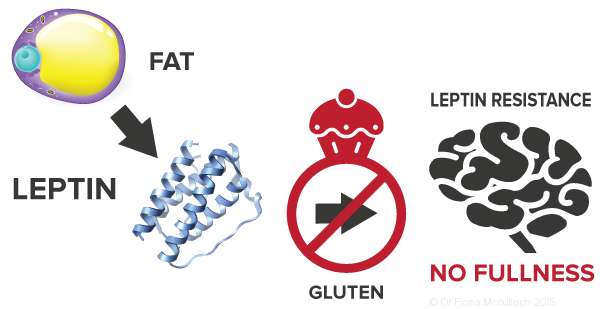Leptin is an appetite-regulating hormone that is made by our fat cells. It has the vital function of telling our brains that we are full, have sufficient fat stores inside of our fat cells and do not need to consume more food. It’s like the “off switch” for hunger.
When we eat a meal, our insulin rises, which causes the glucose from our meal to be stored as fat. Once the fat has been stored, leptin is secreted by fat cells telling our brains that we have consumed enough energy. In some cases, this mechanism can go awry, in a condition known as leptin resistance.
Leptin resistance happens when our fat cells over-produce leptin, or produce it in dysregulated patterns. Overproduction of leptin happens when we eat too often, eat too much, or have too many fat cells within our bodies that are constantly producing leptin. Our brains have no choice but to shut down their responses to this important hormone, as the receptors are constantly flooded with it. The brain loses its sensitivity to the messages that tell us to stop eating.
Our brains believe, in essence, that we are starving – the message that we have eaten enough no longer gets in. We get hungrier and hungrier. This is leptin resistance – and it has been linked to weight gain, obesity and excessive hunger – even eating disorders.
A recent study released on January 20th, 2015 has linked the ingestion of gluten to leptin resistance. After we eat gluten (found in grains such as wheat, rye, spelt, and barley), particles of gliadin and other gluten-related proteins can be found floating in the serum of our blood. In this groundbreaking study, researchers first broke the gluten down with the same digestive enzymes found in our intestines. Then, they placed the digested gluten in proximity to both leptin and cells with leptin receptors, and measured the ability of leptin to bind to its receptor in the presence of gluten. This was repeated with different concentrations of gluten-related proteins in the solution.
What they found was shocking. Gluten inhibited the binding of leptin to its receptor in a concentration-dependent manner. In fact, gluten reduced leptin binding by 50% at a concentration of 10ng/ml. This same concentration is commonly found in human serum after consuming dietary amounts of gluten-containing foods such as breads and pasta.
It’s already been shown repeatedly that leptin resistance is linked directly to our weight. The less that leptin can bind to its receptor, the more leptin that our fat cells will secrete in their attempts to be heard by our brains and the more resistant we become. It’s a vicious cycle.
Is gluten-induced leptin resistance one factor associated with the modern-day spike in obesity? Most likely. Massive amounts of gluten are being consumed in the North American diet.
Bottom Line
Should we be concerned about eating gluten if we are insulin resistant and trying to lose weight? Absolutely.
Have you noticed any change in your appetite or weight after eliminating gluten? Please share your story or helpful information below!
Article References:
- Jönsson T, Memon AA, Sundquist K, Sundquist J, Olsson S, Nalla A, Bauer M, Linse SDigested wheat gluten inhibits binding between leptin and its receptorBMC Biochem2015 Jan 20;16(1):3.

